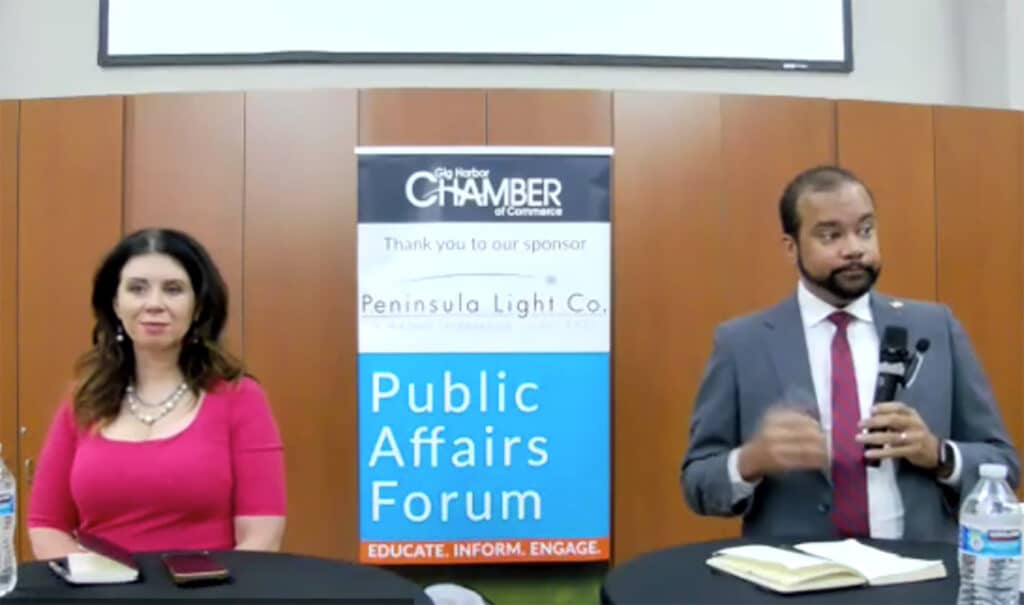Community Government
Candidates Caldier and Macklin discuss education, health care and growth
Crime and the economy have been the top issues in this fall’s campaign, judging by questions asked by audiences at a series of debates and forums.
So it was a change that the first question asked of candidates Michelle Caldier and Matt Macklin at a forum Thursday was about education.
Caldier is a four-term Republican incumbent who recently moved to Gig Harbor from Port Orchard. Macklin, a Democrat with backgrounds in nursing home administration and as a lawyer, is a Port Orchard resident making his first run for elective office.
The are candidates for the state House of Representatives position 2 in the 26th Legislative District, which includes Gig Harbor, the Key Peninsula, Port Orchard and parts of Bremerton. The election in Nov. 8, but voters should receive their ballots this week or next.
Education
Both candidates suggested substantial education reforms.
Caldier, a longtime foster parent, noted that foster children often struggle the most of any demographic group. She suggested expanded school choice as a solution.
“We need to make sure that our schools have accountability, we need to make sure that if they’re not, I believe we should have flexibility with where the child can go,” Caldier said. “And we need to be creative, because right now kids are failing. We need to make sure that the standards are up.”
Macklin said the Covid-19 pandemic exacerbated inequity in education. He pointed to a shortage of workers in skilled trades and suggested schools should try a new approach.
“I think we should look at models that are applied in Germany, where aptitude testing and trades are identified for individuals earlier on, and we pursue those trades in early to mid-high school. That way, we are giving people an opportunity to leave high school with an actual marketable profession,” Macklin said, listing building trades, nursing and public safety jobs as beneficiaries of this approach.
Public Affairs Forum Macklin & Caldier from Gig Harbor Chamber of Commerce on Vimeo.
Housing and the Growth Management Act
Gig Harbor Mayor Tracie Markley asked both candidates about a “missing middle” housing bill expected next session. A similar bill failed last session.
Missing middle refers to efforts to funnel population and housing growth into cities, even smaller cities like Gig Harbor.
The question elicited responses referencing the state’s Growth Management Act, a 1990 law that restricts growth outside urban areas.
“The Growth Management Act needs to be updated to really reflect our current needs and challenges,” Macklin said. “I’m not in favor of getting rid of it, because that would be a disaster, but I think that for term after term after term we failed to …. update to meet the current needs.”
Caldier expressed skepticism of the GMA, which she said “allows very little area for builders to build in.” She said she and fellow Republicans are united in wanting to reform GMA, but they are the minority party.
“In the minority, I may not be able to control the train wreck that is coming, but a lot of times I can put an amendment on that can steer it a better direction,” she said. “For example, exempting out smaller cities from the GMA and figuring out how to get support for that.”
Health care
An audience member asked candidates if they supported what the questioner referred to as “government-controlled” health care. It’s a subject both candidates have experience with — Macklin as a nursing home administrator, Caldier in her pre-legislator career as a dentist.
Caldier called Medicaid “woefully underfunded.” She recounted her experiences as a dentist who took Medicaid, citing low reimbursement rates and excessive paperwork.
“I think we need to fix our Medicaid system before we ever start thinking that the government can do a much better job than the private enterprise,” Caldier said.
Macklin said health care is a right, not a privilege. He pointed out that Medicaid is limited to only “the sickest and those who can’t afford to pay,” limiting the pool of subscribers. He called for a model that includes both the public and private sectors.
“It’s not a business. It’s a mission, health care,” Macklin said. “We need to start viewing it that way and we need to start viewing our rendering of that service that way.”

Rep. Michelle Caldier, R-Gig Harbor, and Democratic challenger Matt Macklin of Port Orchard at a Gig Harbor Chamber of Commerce Public Affairs Forum debate on Thursday, Oct. 20.
